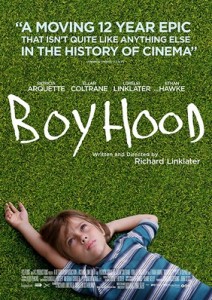A film, truly worthy of praise, is something to be cherished and discussed and relived and remembered.
A work of cinema that leaves you paralyzed once the theater lights have returned is the mark of something truly unique. Each year we are bombarded with more than enough movies to entertain, but few which elicit our most private angst or apprehension. Boyhood is an example of the latter. It’s raw, powerful and truly touching in, at times, an almost insufferable way.
 Boyhood follows Mason Evans, Jr., through 12 years of his life, and all the changes, in character and environment, he undergoes throughout that time. The film was shot over the course of these 12 years and uses all the same actors from beginning to end. Utilizing this filming style so the audience has to suspend their disbelief as little as possible is remarkable but the technical achievement of filming a single movie for such time, while retaining a consistent tone and visual aesthetic, is truly astounding.
Boyhood follows Mason Evans, Jr., through 12 years of his life, and all the changes, in character and environment, he undergoes throughout that time. The film was shot over the course of these 12 years and uses all the same actors from beginning to end. Utilizing this filming style so the audience has to suspend their disbelief as little as possible is remarkable but the technical achievement of filming a single movie for such time, while retaining a consistent tone and visual aesthetic, is truly astounding.
Every minute alteration made in youth can be seen and, most importantly, I don’t think there is a single person who could walk out Boyhood without seeing themselves in some part of the film.
From the separation of his parents, to his artistic passion, I saw myself in Mason many times throughout the movie. Often, these were the most difficult scenes to watch too. The film’s writer and director, Richard Linklater, so perfectly encapsulated the subtle pains and anxiety of childhood. As Mason witnessed his parents struggle with each other and their role in life, I found myself reflecting on my own parent’s divorce more than I would have liked to. But this is part of what made Boyhood such a moving artistic achievement.
It’s the most truthful and honest film of the year and if John Keats’ famed lines: “Beauty is truth, truth beauty’-that is all/Ye know on Earth, and all ye need to know.”
Retain any accuracy today, then Boyhood is the most beautiful film this year and the only one you need to see.






